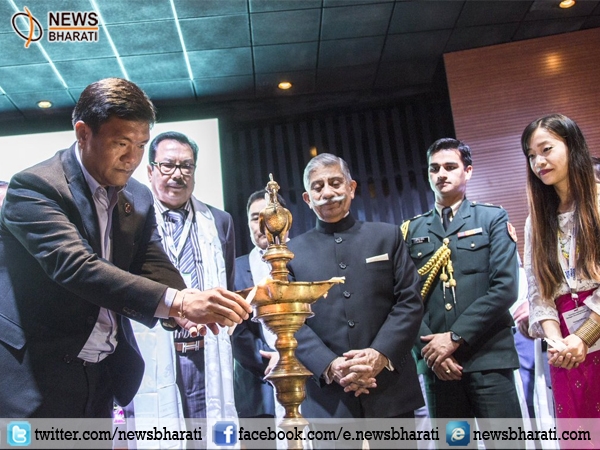Poorest of poor must benefit from the development schemes: Arunachal Governor
Itanagar, December 8: Poorest of poor must benefit from the development schemes, said the Arunachal Governor Dr B D Mishra while addressing the two day conclave, ‘Dream Change: Reshaping the Development Discourse of Arunachal Pradesh’. The two-day conclave, titled ‘Dream Change: Reshaping the Development Discourse of Arunachal Pradesh’ got under way in the Plenary Hall of the State Legislative Assembly here on Friday.

The governor urged the participants in the conclave to explore means and ways for the inclusive growth in the state, “wherein the welfare challenges to the last man at the last rung of the society is addressed.”
He urged them to focus on the 11 amenities – food, clothing, shelter, road, electricity, water supply, education, security, healthcare, justice, and employment – which, he said, should reach the people.
Mishra reminded the participants that they must ensure that taxpayers’ money is utilized for development purposes with well-defined beneficial objectives.
“There must be transparency, accountability and review and audit of fund utilization. Project implementation must have continuity and be done in safe and secure social environment,” he said.
Stating that the initiative would be a trailblazer that would benefit the state and its people, the governor advised that the recommendations of the conclave be compiled, sifted, studied, integrated into plans, and implemented in a time-bound manner for the benefit of the poorest of the poor.
Chief Minister Pema Khandu in his address emphasized on formulating holistic policies to accelerate the pace of development in the state, besides converting investments into capital.
Enumerating the initiatives of the government, Pema said that despite many challenges in the connectivity sector, the government is taking up the construction of the TAH, rail connectivity to Guwahati and Delhi, making ALGs functional, besides working on bringing rail line in foothill areas of the state.
He said that the state has immense potential in agriculture and allied sectors, tourism, hydropower, etc, which need to be harnessed to the optimum to benefit the people.
Stressing on the need to channelize the youths’ energy in right direction, the chief minister called for evolving a proper policy to address the issue, adding that “this would bring wonders in many fields.”
Pema strongly advocated having a separate IAS cadre for Arunachal Pradesh for effective implementation of all central and state government programmes in the state.
“Arunachal Pradesh being a multi-tribe state, AGMUT cadre officers often faces difficulties in dealing with the situations and problems,” he added.
Deputy Chief Minister, Chowna Mein stressed on reforming the land laws, and called for developing an interim regulatory framework or a land policy for conferring ownership rights, including title to land, to local inhabitants of the state in a time-bound manner “for empowering the local communities, besides benefitting them financially, along with creation of new job opportunities.”
He laid stress on devising ways to unlock the huge potential of the land for accelerating economic development. He also advocated developing land-based economic activities through development of enterprises in agriculture, horticulture, medicinal plants, bamboo, and orchids to make the products available across the state as well as in the global market.
Mein also proposed promoting nature-based tourism as one of the best ways for generating internal revenue, employment and accelerating development besides protecting the rich, natural and cultural heritage. He also pitched on bringing in reputed and credible tourism players from private sectors to associate with the government for making the efforts beneficial for local communities. He also called for breaking the vicious problem of unemployment through quality education and skill development.
Being attended by over 100 speakers, including policymakers, experts, bureaucrats, academicians, professionals, practitioners, researchers, scholars, thought leaders, and students, the conclave will discourse and bring forth the issues of re-examining and re-visiting the existing development agenda of the state, and draw up a sustainable and holistic policy paradigm for a better Arunachal Pradesh.